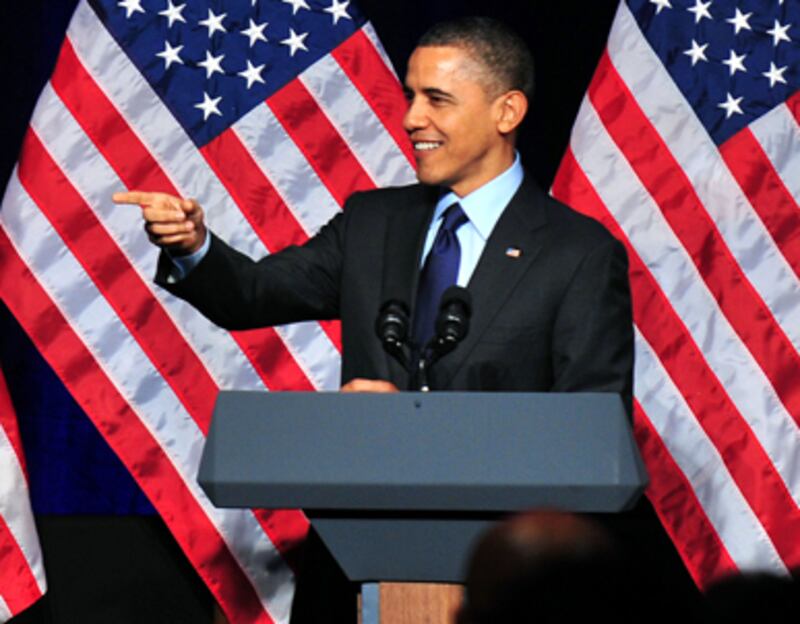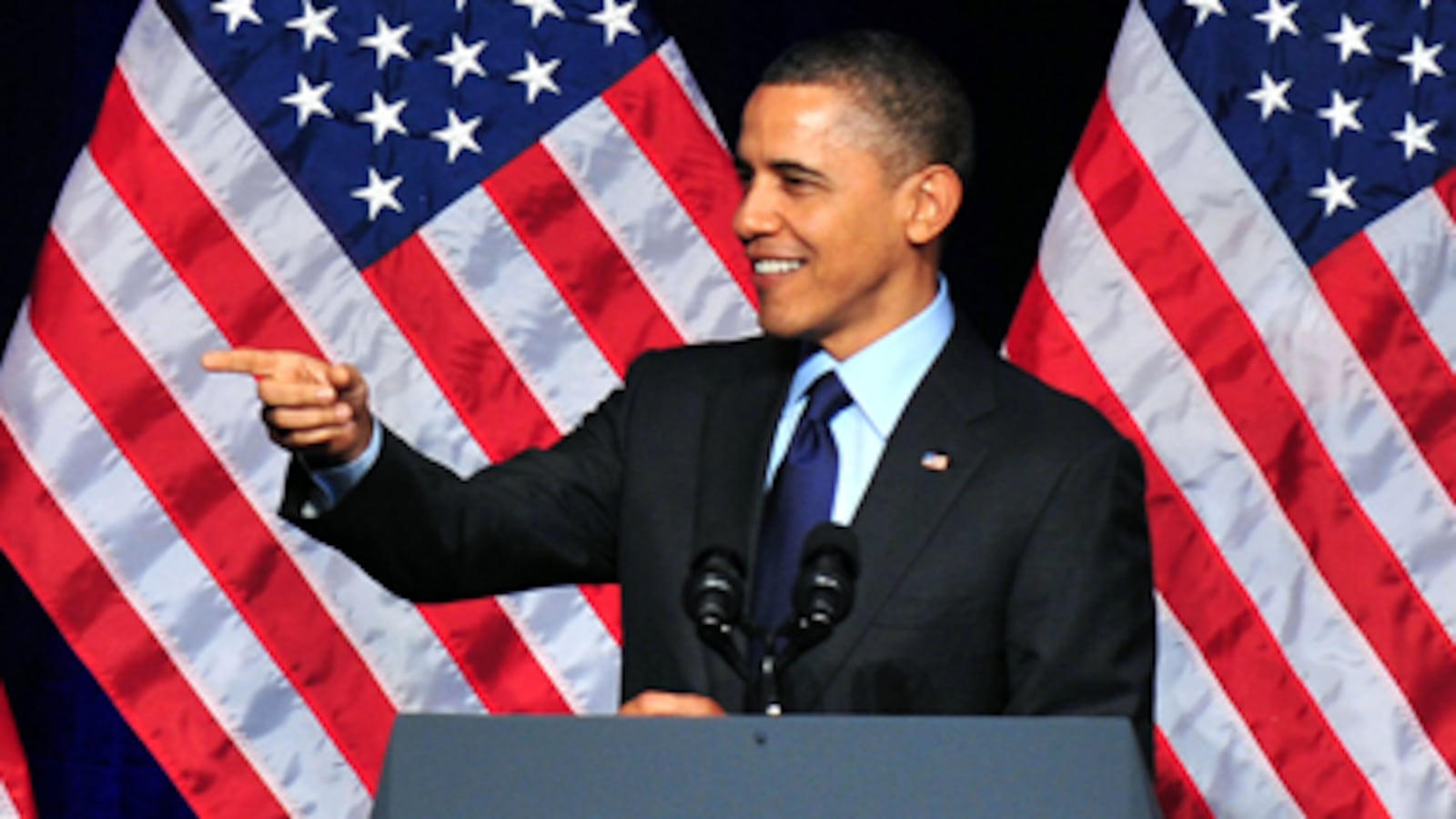The next presidential race will be driven by more money than ever before—and the GOP is already besting the Dems' fundraising. Peter H. Stone of the Center for Public Integrity reports on the tactics behind the furious money grab.
At a Washington hotel and a building blocks from the White House, the smell of money—big money—was in the air.
In a speech Wednesday to some 500 top Democratic fundraisers, President Obama focused on what's he's accomplished so far and the serious challenges ahead such as energy, the red-ink budget and the Middle East.
Across town, Wisconsin Republican lawmakers were toasted at a fundraiser hosted by the lobbying shop BGR Group, founded by potential GOP presidential candidate Haley Barbour. BGR was picketed by liberal groups furious over the state's gutting of collective bargaining for public employee unions.

It was a curious juxtaposition of the 2012 money dynamic: Obama aiming to raise $1 billion for his reelection campaign and Barbour, the Mississippi governor, a symbol of the large GOP field jockeying for millions to run against him.
Obama's low-key afternoon talk was delivered to DNC fundraisers comprised mostly of "bundlers" who roped in hundreds of thousands each to help him get elected. "I've always been a firm believer that good policy was good politics," he said.
Mitchell Berger, a Florida lawyer who raised more than $200,000 in 2008 for Obama, said the president stressed the issues he wants to tackle in the next two years and in a second term. "He's been there and he's grown and learned and he's ready to do more," Berger said.
The DNC meeting was a prelude to months of frenetic fundraising work for his elite bundlers and his drive for a second term. Similarly, several of Obama's GOP rivals who are weighing White House runs are also busy courting well-connected Wall Street and corporate executives to bundle large sums for them.
Wrangling hundreds of thousands is no mean feat: Under federal law, individuals are limited to giving $2,500 per election to a candidate for president, or $5,000 for the primary and general elections combined.
In 2008, 324 bundlers raised at least $100,000 apiece for Obama, according to the Center for Responsive Politics. For John McCain, 301 bundlers raised more than $100,000.
The field of potential Republican challengers tops a dozen, and about half of them will probably raise $50 million each in a primary slugfest to secure the nomination. GOP operatives predict the Republican nominee will need at least $500 million for the general election just to be competitive.
The midterm elections rang up a campaign-finance tally just shy of $4 billion, a number likely to be dwarfed by a 2012 spending spree.
All told, the midterm elections rang up a campaign finance tally just shy of $4 billion, a number likely to be dwarfed by a 2012 spending spree that will feature a no-holds-barred race for the White House.
The Democrats, though, are in a defensive crouch. They have no Karl Rove, with his marquee fundraising appeal. [j1]
Fresh off his astonishing success helping two GOP-allied groups raise tens of millions in 2010, Rove has set his laser-like focus on the 2012 trifecta: capturing the White House and Senate while keeping the House.
The Democrats are desperately seeking their own Rovian figure. They were late to tap into the avalanche of unregulated money unleashed by the Supreme Court ruling in January 2010, letting Rove, former White House counselor Ed Gillespie and other Republican moneymen write the new script for a Wild West era of campaign finance.
The Supreme Court ruling in Citizens United v. Federal Election Commission gave the green light to corporations and unions to spend unlimited sums on ads and other campaign tools to directly advocate for a candidate's election. Curbs on campaign finance adopted after the Watergate era were gutted.
Suddenly, six- and seven-figure checks were the weapon of choice in politics. Rove and other savvy political players channeled tens of millions to groups like the American Crossroads[p3] , which by law must disclose its donors, and its affiliate Crossroads GPS, which can keep donors' names secret. These two groups hope to rake in $120 million for 2012, compared to $71 million last year.
Democrats initially stayed on the sidelines. But by fall, as the House began to slip away, the American Federation of State, County and Municipal Employees jumped in with $91 million, which led spending by all groups. AFSCME President Gerald McEntee said unions, now at war in states like Wisconsin with newly elected Republican governors, are determined to do more.
"We have to build a broader coalition to counter Rove and company," McEntee said. "2010 provided a lesson and a beating. We have a lot of work to do."
Where will the money come from?
For the Democrats: Obama's independent Democratic allies hope to lure millions from George Soros, the billionaire philanthropist and hedge-fund titan who sat out 2010. For now, they have a commitment from several rich liberals, including Taco Bell heir Rob McKay, who is backing David Brock's new venture, American Bridge 21st Century[j4] . Brock, a former conservative journalist turned head of the liberal group Media Matters, hopes to spend millions on opposition research and television ads to influence the presidential and congressional elections. Two former White House aides, Bill Burton and Sean Sweeney, are launching another group to focus on Obama's reelection.
For the Republicans: GOP efforts got a head start in 2010 from big donors including Houston home builder Robert Perry, who gave $7 million to American Crossroads. Multi-billionaires David and Charles Koch several years ago launched and helped finance Americans for Prosperity, which planned to spend $45 million last year.
But talk of millions and billions is deflating to voters who gave small amounts to their favorite candidates.
"There is no way I can go up against mighty corporations," said Laska Nygaard, 40, a stay-at-home mom in St. Paul, Minnesota, who gave Obama $75 in 2008. "It seems like a tsunami of money."
A wild card is money from donors whose names remain secret. In the 2010 elections, the lion's share of the $71 million the two Rove groups raised went to Crossroads GPS, which has the 501(c)4 tax status that allows it to accept undisclosed donations.
Campaign-finance-reform advocates are also upset about the burgeoning piles of secret donations. "History tells us that secret money leads to corruption and scandals," said Fred Wertheimer, who runs the nonpartisan Democracy 21. "In 2012 we may well face hundreds of millions in secret contributions flowing into the presidential and congressional elections."
Altogether in the 2010 elections, conservative groups spent $190 million on ads and independent expenditures, while liberal-leaning organizations spent just $92.7 million, according to the Center for Responsive Politics. Tens of millions more were spent by unions and some conservative groups to get out the vote.
Several of these outside groups, both liberal and conservative, have recently run ads or launched grassroots campaigns in response to the furor over the Wisconsin legislators who worked with Republican Gov. Scott Walker to eliminate most collective bargaining for public employee unions. A thousand union members and activists were out in force Wednesday to protest the BGR fundraiser, in a sign of the campaign about to begin.
Peter H. Stone leads the money and politics team at the Center for Public Integrity, a nonpartisan investigative journalism group in Washington. Stone is the author of the recently released paperback Casino Jack and the United States of Money.






